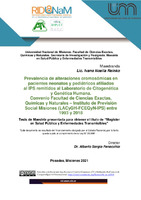| dc.rights.license | Licencia de Creative Commons Reconocimiento-NoComercial-CompartirIgual 4.0 Internacional (CC BY-NC-SA 4.0) | |
| dc.contributor | Fenocchio, Alberto Sergio | |
| dc.creator | Reinko, Ivana Noelia | |
| dc.date.accessioned | 2022-05-15T17:18:13Z | |
| dc.date.available | 2022-05-15T17:18:13Z | |
| dc.date.issued | 2021-12-10 | |
| dc.identifier.citation | Universidad Nacional de Misiones. Facultad de Ciencias Exactas, Químicas y Naturales. Secretaría de Investigación y Postgrado. Maestría en Salud Pública y Enfermedades Transmisibles (2021). Prevalencia de alteraciones cromosómicas en pacientes neonatos y pediátricos afiliados al IPS remitidos al Laboratorio de Citogenética y Genética Humana. Convenio Facultad de Ciencias Exactas, Químicas y Naturales – Instituto de Previsión Social Misiones (LACyGH-FCEQyN-IPS) entre 1993 y 2018 ( Tesis de Maestría) / Director Dr. Alberto, Fenocchio; Maestranda, Lic. Ivana Noelia Reinko. Posadas (Misiones): UNaM. FCEQyN.MByF.SIyP.MSPyET. 78 p. | es_AR |
| dc.identifier.other | TM-029 | |
| dc.identifier.uri | https://hdl.handle.net/20.500.12219/3067 | |
| dc.description | Fil: Reinko, Ivana Noelia. Universidad Nacional de Misiones. Facultad de Ciencias Exactas, Químicas y Naturales. Secretaría de Investigación y Postgrado. Maestría en Salud Pública y Enfermedades Transmisibles; Argentina. | es_AR |
| dc.description | Fil: Reinko, Ivana Noelia. Universidad Nacional de Misiones. Facultad de Ciencias Exactas, Químicas y Naturales. Laboratorio de Citogenética y Genética Humana; Argentina. | |
| dc.description | Fil: Reinko, Ivana Noelia. Instituto de Previsión Social Misiones; Argentina. | |
| dc.description.abstract | La Citogenética Humana tiene como objeto de estudio el análisis de las características de los cromosomas, tanto en número como en estructura, su estudio permite la asociación de ciertas enfermedades con alteraciones cromosómicas numéricas o estructurales, que al estar asociadas a cuadros clínicos específicos se denominan cromosomopatías. El conocimiento de las anomalías cromosómicas es básico en genética médica y otras áreas de la medicina, sobre todo pediatría, para la evaluación de las enfermedades de causa cromosómica. Con la finalidad de evaluar la prevalencia de alteraciones cromosómicas y describir los tipos de alteraciones cromosómicas en pacientes afiliados al Instituto de Previsión Social (IPS) en período neonatal y pediátrico analizados en el Laboratorio de Citogenética y Genética Humana de la Facultad de Ciencias Exactas, Químicas y Naturales de la UNaM entre 1993 y 2018, se realizó un estudio observacional, descriptivo, de corte transversal. Se estudiaron 1643 muestras de pacientes neonatos y pediátricos, 60,80% (999/1643) presentaron cariotipo normal, 27,39% (450/1643) mostraron alguna alteración cromosómica y 11,81% (194/1643) presentaron algún inconveniente en el crecimiento celular. Las preparaciones cromosómicas se obtuvieron mediante el cultivo de linfocitos en sangre periférica y se empleó Bandeo GTG para el análisis de todo el complemento cromosómico. Los bandeos C y NORs sirvieron para confirmar y/o descartar variantes polimórficas. En lo referido a los cariotipos patológicos hallados en neonatos, 34,73% (282/812) cariotipos fueron portadores de alteraciones cromosómicas, 90,43% (255/812) correspondieron a alteraciones numéricas, en tanto 9,57% (27/812) pacientes mostraron alteraciones cromosómicas de tipo estructural. En los pacientes pediátricos se observaron 168 cariotipos patológicos, de éstos 79,76% (134/831) corresponden a alteraciones numéricas y 20,24% (34/831) pacientes portan alteraciones cromosómicas de tipo estructural. La prevalencia de anomalías cromosómicas encontrada enfatiza la necesidad de determinar el cariotipo para su abordaje clínico y asesoramiento familiar, también para la evaluación del servicio de citogenética en el transcurso del tiempo. | es_AR |
| dc.description.abstract | Human Cytogenetics has as its object of study the analysis of the characteristics of chromosomes, both in number and in structure, It´s study allows the association of certain diseases with numerical or structural chromosomal alterations, which, since they are associated with specific clinical conditions, are called chromosomopathies. Knowledge of chromosomal abnormalities is basic in medical genetics and other areas of medicine, especially pediatrics, for the evaluation of diseases of chromosomal cause. In order to assess the prevalence of chromosomal alterations and describe the types of chromosomal alterations in patients affiliated with the Social Security Institute (IPS) in the neonatal and pediatric period analyzed in the Laboratory of Cytogenetics and Human Genetics of the Faculty of Exact, Chemical and Natural Sciences of the UNaM between 1993 and 2018, an observational, descriptive, cross-sectional study was carried out. 1643 samples from neonatal and pediatric patients were studied, 60,80% (999/1643) had a normal karyotype, 27,39% (450/1643) showed some chromosomal alteration and 11,81% (194/1643) presented some inconvenience in cell growth. Chromosomal preparations were obtained by culturing lymphocytes in peripheral blood and the GTG Banding was used to analyze the entire chromosomal complement. Bands C and NORs served to confirm and / or rule out polymorphic variants. Regarding the pathological karyotypes found in neonates, 34.73% (282/812) karyotypes were carriers of chromosomal alterations, 90.43% (255/812) corresponded to numerical alterations, while 9.57% (27/812) patients showed structural chromosomal alterations. In pediatric patients, 168 pathological karyotypes were observed, of these 79.76% (134/831) correspond to numerical alterations and 20.24% (34/831) patients carry structural chromosomal alterations. The prevalence of chromosomal abnormalities found emphasizes the need to determine the karyotype for its clinical approach and family counseling, also for the evaluation of the cytogenetics service over time. | |
| dc.format | application/pdf | |
| dc.format.extent | 1.577 MB | |
| dc.language.iso | spa | es_AR |
| dc.publisher | Universidad Nacional de Misiones. Facultad de Ciencias Exactas, Químicas y Naturales. Secretaría de Investigación y Postgrado. Maestría en Salud Pública y Enfermedades Transmisibles | es_AR |
| dc.rights | info:eu-repo/semantics/openAccess | |
| dc.subject | Prevalencia de alteraciones cromosómicas | es_AR |
| dc.subject | Pacientes neonatos y pediátricos | es_AR |
| dc.subject | IPS | es_AR |
| dc.subject | Laboratorio de Citogenética y Genética Humana | es_AR |
| dc.subject | 1993 | es_AR |
| dc.subject | 2018 | es_AR |
| dc.title | Prevalencia de alteraciones cromosómicas en pacientes neonatos y pediátricos afiliados al IPS remitidos al Laboratorio de Citogenética y Genética Humana. Convenio Facultad de Ciencias Exactas, Químicas y Naturales – Instituto de Previsión Social Misiones (LACyGH-FCEQyN-IPS) entre 1993 y 2018 | es_AR |
| dc.type | info:eu-repo/semantics/masterThesis | |
| dc.type | info:ar-repo/semantics/tesis de maestría | |
| dc.type | info:eu-repo/semantics/acceptedVersion | |



